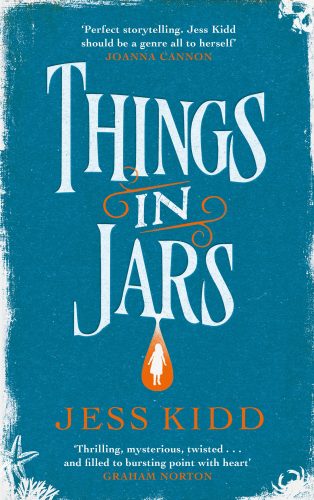
Victorian gothic: possibly my favourite genre.
Here, Jess Kidd creates a darkly poetic and watery tale. At it’s heart: Bridie Devine, formerly a resurrectionist’s girl, then a medic’s trusted extra hands, and finally a private detective with a penchant for mind altering blends of tobacco and the odd nip of Madeira.
I felt like I shouldn’t like this (this is a tale firmly rooted in the supernatural), but I definitely did.
What’s it about?
Things that should not exist.
Irish folklore and myth. Men and women who live and breathe violence, anomalies and deceit.
Gideon Eames, a man who will open you up just to see what your insides look like, and the sublimely unperturbed Mrs Bibby, a woman with pus claimed toes and a leg badly in need of amputation, whose cunning and malevolence means she may yet outlive the rest of the cast…
When Sir Edmund Berwick hires Bridie Devine to find his stolen daughter, Christabel, Bridie soon realises that Sir Edmund is a collector of water based curiosities and Christabel may not be his daughter at all.
Can Bridie locate the young girl? Can rumours of Christabel’s terrifying talents possibly be true? And what will Bridie do with Christabel if she does find her?
What’s it like?
Poetical. Intense. Fantastical.
A wonderful depiction of the nonchalance of true evil in an openly brutal era. Oh, and it’s funny, too.
Written in the present tense throughout, except for the regular flashbacks to Bridie’s adolescence, the expansive narrative voice turns London and it’s ancient rivers into a character equally as much as a passing raven. This approach can sometimes lead to a little confusion about happenings, but it does make for a wonderfully lyrical narrative.
A very few favourite quotes:
‘The servants slumber on…The cook snores fruity, unpeeled and well-soaked under warm sheets, as solid and brandy-scented as plum pudding. She dreams of matchless soufflés; she hunts them down as she sails in a saucepan over a gravy sea.’
‘Sir Edmund’s home is an architectural grotesque, the ornate facade the unlikely union of a war-ship and a wedding cake.’
‘Sir Edmund has done wrong in his collecting. He has been ruminating on his wrong-doing and on the punishments (legal and spiritual) he might reasonably expect. And so rounding the house in a heightened state of remorse and morbid dread, Sir Edmund readily mistakes Bridie Devine for a retributive being of the underworld. A banshee perhaps, or a malevolent imp; it is dusk and her bonnet has the air of a demonic presence perching mid-flight. It takes Bridie several minutes to coax the baronet out of an hydrangea.’
‘The back gates are open. They pass through them and follow the road round, with the high wall bordering Sir Edmund’s estate to their left and the woods to their right. The autumn colours are rich in the early sun, with golden tones and deep reds and startling oranges against a rinsed blue sky. The air is rowdy with birdsong.Â
‘’Clean air: a tonic to the lungs,’ says Ruby. ‘What does it smell like, Bridie?’Â
‘’Leaf mould, cow shit and this fella’s feet.’’
Final thoughts
A deeply enjoyable read, for the wonderfully arranged words, the flashes of humour and bathos, the strange-but-recognisably-dark-and-filthy-Victorian-atmosphere and the memorable characters. All these wonderfully effective aspects of Kidd’s writing kept me hooked, rather more than for the story itself, which is in places a little predictable and in other places has, perhaps, an unnecessary flourish or two. What, exactly, was the point of Bad Dorcas’ last story? But maybe in seeking a point I am missing a point: that this is at least partly a story about the power of stories.
Keep an eye out for the ghost in top hat, drawers and loose laced boots. This is the point at which I feel I would have given up on most books featuring a ghost, but Kidd’s style kept me enjoying the narration to the end.